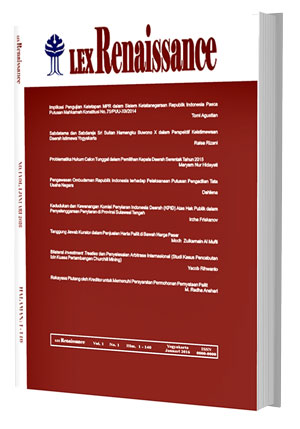Main Article Content
Abstract
Unfair business competition is often found in various industries which are called oligopoly markets. The oligopoly market dominates the market of several business actors who have large capital and desire to obtain big profits, but it is often found that business actors practice trade monopolies. The author formulates problems related to how is the principle of the rule of reason applies to the alleged practice of cartels according to Article 11 of Law Number 5 of 1999 on the Prohibition of Monopolistic Practices and Unfair Business Competition? This type of research is normative juridical with a statutory approach and is compiled through qualitative descriptive. The results of this study conclude that the agreement in the practice of cartels is carried out between business actors to influence the marketing of goods to price fixing agreements, while Law Number 5 of 1999 has prohibited the practice of cartels in Indonesia. Thus, this evidence refers to the principle of the rule of reason, namely the alleged occurrence of a price fixing cartel can be proven if there is a negative effect or hinders fair business competition.
Key Words: Cartel; bankruptcy; unfair competition
Persaingan usaha tidak sehat sering dijumpai di berbagai ragam industri yang disebut dengan pasar oligopoli. Pasar oligopoli mendominasi pasar dari beberapa pelaku usaha yang memiliki modal yang besar dan ingin mendapatkan keuntungan besar, tetapi justru sering ditemukan para pelaku usaha melakukan praktik monopoli dagang. Penulis merumuskan permasalahan berkaitan dengan bagaimana prinsip rule of reason terhadap praktik dugaan kartel menurut Pasal 11 Undang-Undang Nomor 5 Tahun 1999 tentang Larangan Praktek Monopoli dan Persaingan Usaha Tidak Sehat? Jenis penelitian ini adalah yuridis normatif dengan pendekatan perundang- undangan dan disusun melalui deskriptif kualitatif. Hasil penelitian ini menyimpulkan bahwa perjanjian dalam praktik kartel ini dilakukan antar pelaku usaha untuk mempengaruhi pemasaran barang hingga perjanjian penentuan harga, sementara Undang-Undang Nomor 5 Tahun 1999 telah melarang praktik kartel di Indonesia. Dengan demikian, pembuktian ini mengacu pada prinsip rule of reason yaitu dugaan terjadinya kartel penetapan harga dapat dibuktikan jika terdapat efek negatif atau menghambat persaingan usaha yang sehat.
Kata-kata Kunci: Kartel; kepailitan; persaingan usaha tidak sehat
Keywords
Article Details
Authors who publish with this journal agree to the following terms:
a. Authors retain copyright and grant the journal right of first publication with the work simultaneously licensed under a Creative Commons Attribution License that allows others to share the work with an acknowledgement of the work's authorship and initial publication in this journal.
b. Authors are able to enter into separate, additional contractual arrangements for the non-exclusive distribution of the journal's published version of the work (e.g., post it to an institutional repository or publish it in a book), with an acknowledgement of its initial publication in this journal.
c. Authors are permitted and encouraged to post their work online (e.g., in institutional repositories or on their website) prior to and during the submission process, as it can lead to productive exchanges, as well as earlier and greater citation of published work (See The Effect of Open Access).References
- Buku
- Fuady, Munir, Hukum Antimonopoli Menyongsong Era Persaingan Sehat, PT. Citra Aditya Bakti, Bandung, 1995.
- Syahrani, Riduan, Rangkuman Intisari Ilmu Hukum, PT Citra Aditya Bakti, Bandung, 2011.
- Yani, Ahmad, Widjaja, Gunawan, Seri Hukum Bisnis Anti Monopoli, Fajar Interpratama Offset, Jakarta, 2002.
- Usman, Rachmadi, Hukum Persaingan Usaha di Indonesia, Sinar Grafika, Jakarta, 2013.
- Jurnal
- Adi Sulistyo, “Analisis Yurdis Pengunaan Indirect Evidence Dalam Kasus Kartel Sepeda Motor di Indonesia Ditinjau Dari Hukum Persaingan Usaha Indonesia”, Privat Law, Vol. 6, No. 1, 2018
- Putu Ari Santika, “Pengaruh Sistem Kartel Terhadap Stabilitas Persaingan Usaha di Indonesia”, Jurnal Preferensi Hukum ,Vol. 1, No. 2 , September, 2020.
- Internet
- “Persaingan Usaha Tidak Sehat Dalam Tinjauan Hukum”, https://www.pn-palopo.go.id/index.php/berita/artikel/222-persaingan-usaha-tidak-sehat-dalam-tinjauan-hukum.
- Peraturan Perundang-undangan
- Undang-Undang Nomor 5 tahun 1999 tentang Larangan Praktik Monopoli Perdagangan dan Persangan Usaha Tidak Sehat
- Putusan KPPU Nomor 4/KPPU-I/2016
References
Buku
Fuady, Munir, Hukum Antimonopoli Menyongsong Era Persaingan Sehat, PT. Citra Aditya Bakti, Bandung, 1995.
Syahrani, Riduan, Rangkuman Intisari Ilmu Hukum, PT Citra Aditya Bakti, Bandung, 2011.
Yani, Ahmad, Widjaja, Gunawan, Seri Hukum Bisnis Anti Monopoli, Fajar Interpratama Offset, Jakarta, 2002.
Usman, Rachmadi, Hukum Persaingan Usaha di Indonesia, Sinar Grafika, Jakarta, 2013.
Jurnal
Adi Sulistyo, “Analisis Yurdis Pengunaan Indirect Evidence Dalam Kasus Kartel Sepeda Motor di Indonesia Ditinjau Dari Hukum Persaingan Usaha Indonesia”, Privat Law, Vol. 6, No. 1, 2018
Putu Ari Santika, “Pengaruh Sistem Kartel Terhadap Stabilitas Persaingan Usaha di Indonesia”, Jurnal Preferensi Hukum ,Vol. 1, No. 2 , September, 2020.
Internet
“Persaingan Usaha Tidak Sehat Dalam Tinjauan Hukum”, https://www.pn-palopo.go.id/index.php/berita/artikel/222-persaingan-usaha-tidak-sehat-dalam-tinjauan-hukum.
Peraturan Perundang-undangan
Undang-Undang Nomor 5 tahun 1999 tentang Larangan Praktik Monopoli Perdagangan dan Persangan Usaha Tidak Sehat
Putusan KPPU Nomor 4/KPPU-I/2016




